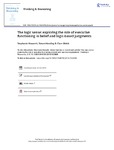The logic sense: exploring the role of executive functioning in belief and logic-based judgments
| dc.contributor.author | Howarth, S | |
| dc.contributor.author | Handley, S | |
| dc.contributor.author | Walsh, Clare | |
| dc.date.accessioned | 2018-11-30T09:39:38Z | |
| dc.date.available | 2018-11-30T09:39:38Z | |
| dc.date.issued | 2019-10-02 | |
| dc.identifier.issn | 1354-6783 | |
| dc.identifier.issn | 1464-0708 | |
| dc.identifier.uri | http://hdl.handle.net/10026.1/12954 | |
| dc.description.abstract |
© 2018, © 2018 Informa UK Limited, trading as Taylor & Francis Group. The Default Interventionist account suggests that by default, we often generate belief-based responses when reasoning and find it difficult to draw the logical inference. Recent research, however, shows that in some instances belief judgments take longer, are more prone to error and are more affected by cognitive load. One interpretation is that some logical inferences are available automatically and require intervention in order to respond according to beliefs. In two experiments, we investigate the effortful nature of belief judgments and the automaticity of logical inferences by increasing the inhibitory demands of the task. Participants were instructed to judge conclusion validity, believability and either font colour or font style, to increase the number of competing responses. Results showed that conflict more strongly affects judgments of believability than validity and when inhibitory demands are increased, the validity of an argument impacts more on belief judgments. These findings align with the new Parallel Processing model of belief bias. | |
| dc.format.extent | 416-448 | |
| dc.language | en | |
| dc.language.iso | en | |
| dc.publisher | Taylor & Francis (Routledge) | |
| dc.subject | Belief bias | |
| dc.subject | intuitive logic | |
| dc.subject | conditional reasoning | |
| dc.subject | dual process theory | |
| dc.subject | inhibition | |
| dc.subject | parallel processing | |
| dc.title | The logic sense: exploring the role of executive functioning in belief and logic-based judgments | |
| dc.type | journal-article | |
| dc.type | Journal Article | |
| plymouth.author-url | https://www.webofscience.com/api/gateway?GWVersion=2&SrcApp=PARTNER_APP&SrcAuth=LinksAMR&KeyUT=WOS:000486293900002&DestLinkType=FullRecord&DestApp=ALL_WOS&UsrCustomerID=11bb513d99f797142bcfeffcc58ea008 | |
| plymouth.issue | 4 | |
| plymouth.volume | 25 | |
| plymouth.publication-status | Published | |
| plymouth.journal | Thinking and Reasoning | |
| dc.identifier.doi | 10.1080/13546783.2018.1523808 | |
| plymouth.organisational-group | /Plymouth | |
| plymouth.organisational-group | /Plymouth/Faculty of Health | |
| plymouth.organisational-group | /Plymouth/Faculty of Health/School of Psychology | |
| plymouth.organisational-group | /Plymouth/REF 2021 Researchers by UoA | |
| plymouth.organisational-group | /Plymouth/REF 2021 Researchers by UoA/UoA04 Psychology, Psychiatry and Neuroscience | |
| plymouth.organisational-group | /Plymouth/REF 2021 Researchers by UoA/UoA04 Psychology, Psychiatry and Neuroscience/UoA04 Psychology, Psychiatry and Neuroscience MANUAL | |
| plymouth.organisational-group | /Plymouth/Research Groups | |
| plymouth.organisational-group | /Plymouth/Research Groups/Centre for Brain, Cognition and Behaviour (CBCB) | |
| plymouth.organisational-group | /Plymouth/Research Groups/Centre for Brain, Cognition and Behaviour (CBCB)/Cognition | |
| plymouth.organisational-group | /Plymouth/Users by role | |
| plymouth.organisational-group | /Plymouth/Users by role/Academics | |
| dcterms.dateAccepted | 2018-09-09 | |
| dc.rights.embargodate | 2019-10-25 | |
| dc.identifier.eissn | 1464-0708 | |
| dc.rights.embargoperiod | Not known | |
| rioxxterms.versionofrecord | 10.1080/13546783.2018.1523808 | |
| rioxxterms.licenseref.uri | http://www.rioxx.net/licenses/all-rights-reserved | |
| rioxxterms.type | Journal Article/Review |


